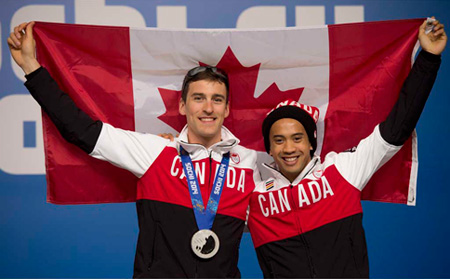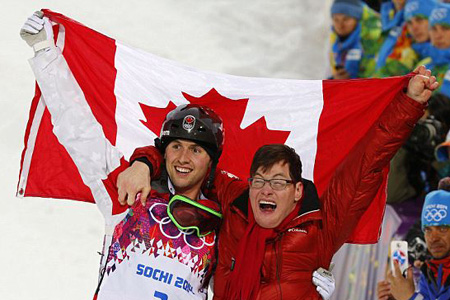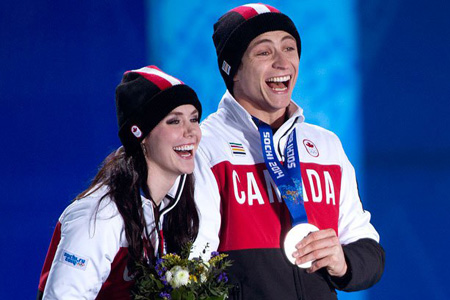With the end of the 2014 Sochi Winter Games on Sunday, many of us are now returning to our regular work routines and viewing habits, having a deeper appreciation for the world of sports and the power of the human spirit. In many ways, that’s probably the most interesting aspect about the Olympics – of how it not only draws us in on sporting events we otherwise wouldn’t follow, but how it also binds us together through that sense of camaraderie and kinship.
Of course, the other interesting aspect of the Olympics is how they provide a microcosm of cause-and-effect; where in the span of a few minutes we can see firsthand what all those years of training and sacrifice have given rise to.
This distilled concentration of human effort and achievement provides a unique backdrop from which we can glean new insights into how we can inspire those around us to believe in their potential to succeed and achieve more than they thought possible.
It’s from that perspective that I’d like to share the following three stories from these Winter Olympic Games where we can discover important lessons on what we need to do to become better leaders for those under our care.
1. Denny Morrison and Gilmore Junio – Putting others ahead of ourselves

When Denny Morrison crossed the finish line in the men’s 1000M speed skating final, the real story wasn’t his winning the silver medal. Instead, it was the fact that his team mate, Gilmore Junio, had given up his spot to allow Morrison to compete at the Sochi Olympic Games.
While competing in the Canadian Olympic team trials, Morrison lost his footing and fell to the ice, leading him to be disqualified from the team. Although Junio skated a clean run to qualify for the Olympic team, he knew that Morrison was the stronger skater and represented a better chance for Canada to get a medal in this event.
And so, Junio gave the spot he had earned for himself to compete at the Olympics to Morrison, saying that he had to so because it was “in the best interest of the team.”
But Junio did more than just give up his place to Morrison so he could compete on behalf of their country. Junio also became Morrison’s training partner, working side by side with Morrison over the past four years to help him to improve his performance and build on his existing strengths.
In winning the silver medal, Morrison said “after what [Junio] did, it made it even more special. Giving up your spot is unprecedented. I feel like getting my medal and cutting it in half because he deserves it.”
We often talk about the importance of delegation in leadership, both in terms of improving overall organizational efficiency, as well as a means for providing leadership development opportunities for our employees. And yet, what’s often delegated is not authority and ownership, but the low profile tasks we don’t want to do ourselves.
If we want to develop the kind of strong, renewable talent we need in our organizations to remain competitive and nimble, we need to delegate opportunities where our employees can shine – opportunities where they can tap into their native talents, insights, and experiences to not only achieve success, but grow into more valued contributors in our organization.
Granted, it’s natural that we might fear that our employees might eclipse us – especially if we give them opportunities to take the lead in such high profile situations as the Olympics.
However, what Morrison and Junio’s story reminds us is that leadership is not about who gets the win. Rather, it’s about finding the means to support and enable those under our care to achieve outcomes that will ultimately define our collective success.
2. Alexandre Bilodeau – Recognizing how others motivate us to be better

During any of these sporting events, it’s only natural that the focus be on the athletes and seeing how they fare against their competitors from around the world. And yet, when Canadian freestyle skier Alexandre Bilodeau stepped up at the start of his gate, those watching the event were not only paying attention to him, but also to his older brother Frederic cheering him on at the bottom of the hill.
As many Canadians remember from Alexandre’s gold medal win at the Vancouver Olympic Games in 2010, Frederic has been a big inspiration for Alexandre in large part because Frederic suffers from cerebral palsy, a congenital physical disability that impairs physical movement.
When Alexandre finished his run down the mountain and realized that he had defended his gold medal title, he immediately found his brother in the crowd and helped him over the security barrier so that they could celebrate together Alexandre’s consecutive gold medal win.
In speaking of his history-making achievement, Alexandre was very clear about the role his brother played in helping him to get onto the podium at Sochi:
“It’s crazy the motivation that he takes and every step is very hard for him. In life, I have an easy path and I need to go out there and do the best I can just out of respect to him. He lives his dreams through me. [Two gold medals] is the least I can do; he’s my every day inspiration.”
Alexandre’s story is not just a wonderful reminder of how we should be grateful for all the things we might take for granted. It also reminds us that one of the most important responsibilities of leadership is being able to motivate and enable our employees to become the better version of themselves.
The reality is that technology, product features, and internal processes are no longer enough to sustain a competitive edge in today’s fast-changing global economy. Instead, the defining factor is our ability to develop our employees to support our organization’s long-term success and ability to thrive.
This, of course, means that we are not only providing them with the right conditions to grow and evolve, but that we’re also tapping into that core psychological need we all have to become better than we are today.
As Alexandre’s story illustrates, as much as we need to achieve the results we’re after, we also need to ensure that we create a sense of connection and purpose for our employees in what they do. That they recognize the value of their contributions not just for themselves, but for those around them as well.
3. Scott Moir and Tessa Virtue – Transforming loss into a celebration of personal achievement

One of the more controversial results of these Olympic Winter Games came from the ice dancing competition where the US ice dancing team of Charlie White and Meryl Davis beat the reining Olympic champions Scott Moir and Tessa Virtue for the gold medal.
While many spectators and analysts questioned the results, when it came time for the medal ceremony, Moir and Virtue didn’t act as though they missed their opportunity to end their skating career on a golden note. Instead, they jumped up onto the silver podium with elation and joy with a clear message that for them, this wasn’t a loss, but a wonderful way to cap off a fruitful and successful collaboration.
Through both their actions and words, Moir and Virtue transformed how their nation viewed their achievement from a gold medal loss to a silver medal success.
Similarly, as leaders we need to recognize that while it’s important to communicate what success looks like for our organization, we also have to help our employees understand how they should interpret those moments when things inevitably go wrong.
In those moments where it’s easy for our employees to feel disappointment and even disillusionment when we miss the mark, we need to communicate through our actions and words our commitment to celebrating our collective efforts – of recognizing the things we got right so that we can encourage our employees to keep pushing to do even better than we did today.
Moir and Virtue’s story reminds us that we can rise above these negative feelings and find that silver lining that will encourage us to believe not only in our potential, but to set even higher expectations on our abilities to succeed going forward.
While time will tell what the legacy will be from the Sochi Winter Olympic Games, the stories of these Olympians will remain as timeless reminders of how we can become a better leader for our employees. Not just in terms of increasing engagement in our workplace, but in our ability to enable our employees to commit their talents, creativity, insights, and experiences to our shared purpose, so that we might ultimately succeed in achieving the collective vision we have for our organization.

Tanveer, thanks so much for sharing these three inspiring lessons from the Olympics. Each is a powerful takeaway.
My pleasure, Eric; I'm glad you enjoyed these stories and the lessons we can take from them on how we can become a better leader for our employees.
Especially the third story helped me so much to solidify my thinking and feelings about the ‘picture of success’ and how to translate into words.Thank you so much !
My pleasure, Guvenc. Glad you enjoyed it.
Thank you for sharing your insights from the Sochi games. The three stories sort of inter-connect: Morrison and Junio show us that winning is not who steps forward ultimately, but who sacrifices that the whole team will rise together; Alexandre and Frederic draws us to see that success is teamwork powered by those on and off the practice field, visible and invisible; Moir and Virtue's story beckons on us to have cause to celebrate – the sun that rises lazily in the morning is the same one that blazes at noon day.
But here's my biggest lesson: Tanveer gives his time and energy, sacrifices comfort and pleasure to observe, organise, interpret, and share these experiences so that we all can win and be joyful and fruitful. I appreciate and admire you for this. Thanks.
I'm glad this piece resonated with you, Yiljap. And I appreciate the kind words about my efforts to inspire others to be a better leader for their team and organization.
Fantastic article Tanveer. These examples of true human leadership and emotion are powerful and I hope resonate with people for a long time. It shows what working with each other can do to build the best people and results.
Are there any physical books about these stories/Olympians?
Thanks!
Unfortunately, Kaytlyn, that I know of there aren’t any books written about these Olympians or their stories. The only reason I was aware of them is that I was watching these events and it came up either during the event commentary or in the after-event interviews. It’s kind of sad as these are great stories that really give some powerful inspiration, which is why I’m glad people can at least learn about these amazing athletes through this piece.